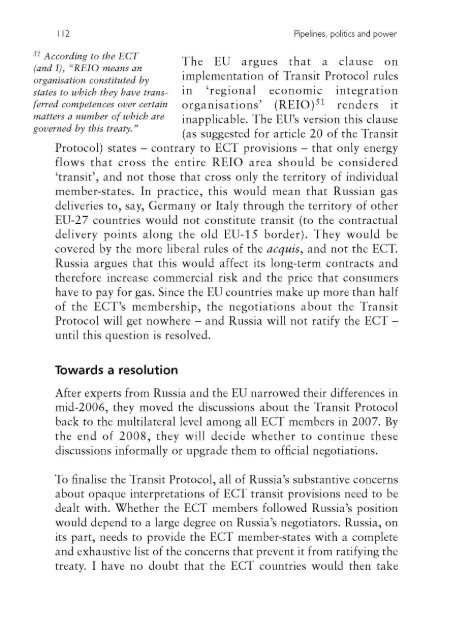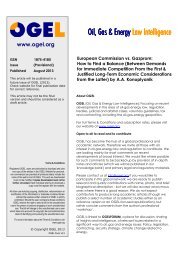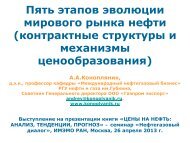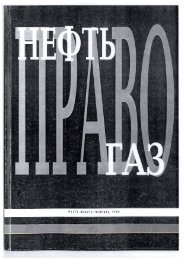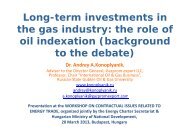Pipelines, politics and power: The future of EU-Russia energy
Pipelines, politics and power: The future of EU-Russia energy
Pipelines, politics and power: The future of EU-Russia energy
Create successful ePaper yourself
Turn your PDF publications into a flip-book with our unique Google optimized e-Paper software.
12 <strong>Pipelines</strong>, <strong>politics</strong> <strong>and</strong> <strong>power</strong><br />
5<br />
(a<br />
1<br />
n<br />
A<br />
d<br />
cc<br />
I )<br />
o<br />
,<br />
r<br />
“<br />
d<br />
R<br />
i n<br />
E<br />
g<br />
I<br />
t<br />
O<br />
o t<br />
m<br />
h<br />
e<br />
e<br />
a<br />
E<br />
n<br />
C<br />
s<br />
T<br />
a n <strong>The</strong> <strong>EU</strong> argues that a clause on<br />
organisation constituted by implementation <strong>of</strong> Transit Protocol rules<br />
states to which they have trans- in ‘regional economic integration<br />
ferred competences over certain<br />
organisations’ (REIO) 51 renders it<br />
matters a number <strong>of</strong> which are<br />
inapplicable. <strong>The</strong> <strong>EU</strong>’s version this clause<br />
governed by this treaty.”<br />
(as suggested for article 20 <strong>of</strong> the Transit<br />
Protocol) states – contrary to ECT provisions – that only <strong>energy</strong><br />
flows that cross the entire REIO area should be considered<br />
‘transit’, <strong>and</strong> not those that cross only the territory <strong>of</strong> individual<br />
member-states. In practice, this would mean that <strong>Russia</strong>n gas<br />
deliveries to, say, Germany or Italy through the territory <strong>of</strong> other<br />
<strong>EU</strong>-27 countries would not constitute transit (to the contractual<br />
delivery points along the old <strong>EU</strong>-15 border). <strong>The</strong>y would be<br />
covered by the more liberal rules <strong>of</strong> the acquis, <strong>and</strong> not the ECT.<br />
<strong>Russia</strong> argues that this would affect its long-term contracts <strong>and</strong><br />
therefore increase commercial risk <strong>and</strong> the price that consumers<br />
have to pay for gas. Since the <strong>EU</strong> countries make up more than half<br />
<strong>of</strong> the ECT’s membership, the negotiations about the Transit<br />
Protocol will get nowhere – <strong>and</strong> <strong>Russia</strong> will not ratify the ECT –<br />
until this question is resolved.<br />
Towards a resolution<br />
After experts from <strong>Russia</strong> <strong>and</strong> the <strong>EU</strong> narrowed their differences in<br />
mid-2006, they moved the discussions about the Transit Protocol<br />
back to the multilateral level among all ECT members in 2007. By<br />
the end <strong>of</strong> 2008, they will decide whether to continue these<br />
discussions informally or upgrade them to <strong>of</strong>ficial negotiations.<br />
To finalise the Transit Protocol, all <strong>of</strong> <strong>Russia</strong>’s substantive concerns<br />
about opaque interpretations <strong>of</strong> ECT transit provisions need to be<br />
dealt with. Whether the ECT members followed <strong>Russia</strong>’s position<br />
would depend to a large degree on <strong>Russia</strong>’s negotiators. <strong>Russia</strong>, on<br />
its part, needs to provide the ECT member-states with a complete<br />
<strong>and</strong> exhaustive list <strong>of</strong> the concerns that prevent it from ratifying the<br />
treaty. I have no doubt that the ECT countries would then take<br />
Regulating <strong>energy</strong> relations: Acquis or Energy Charter 13<br />
<strong>Russia</strong>’s concerns very seriously.<br />
<strong>The</strong> following sequence <strong>of</strong> steps would allow the <strong>EU</strong> <strong>and</strong> <strong>Russia</strong> to<br />
reach an agreement on <strong>energy</strong> matters, <strong>and</strong> also facilitate the<br />
negotiations on the new Partnership Agreement:<br />
• ECT members finalise <strong>and</strong> sign the Transit Protocol;<br />
• <strong>Russia</strong> presents an exhaustive list <strong>of</strong> its other (non-transitrelated)<br />
concerns regarding ECT ratification;<br />
• ECT members address all concerns that have a multilateral<br />
character;<br />
• the Duma simultaneously ratifies the ECT <strong>and</strong> the Transit<br />
Protocol;<br />
• the <strong>EU</strong> <strong>and</strong> <strong>Russia</strong> include a provision in their new Partnership<br />
Agreement that the legal framework for the <strong>Russia</strong>-<strong>EU</strong> common<br />
<strong>energy</strong> space shall be the ECT <strong>and</strong> related documents;<br />
• once all ECT member-states are on an equal footing, it becomes<br />
possible to promote the ECT to other states <strong>and</strong> to discuss the<br />
expansion <strong>of</strong> its substance to strengthen international <strong>energy</strong><br />
co-operation among producer, consumer <strong>and</strong> transit states.<br />
Andrey Konoplyanik was Deputy Secretary General <strong>of</strong> the Energy<br />
Charter Secretariat from March 2002 to April 2008.<br />
•


